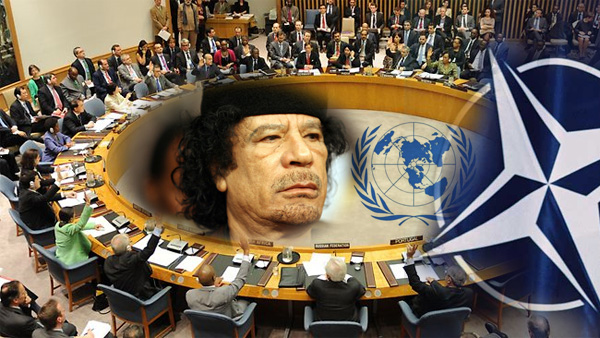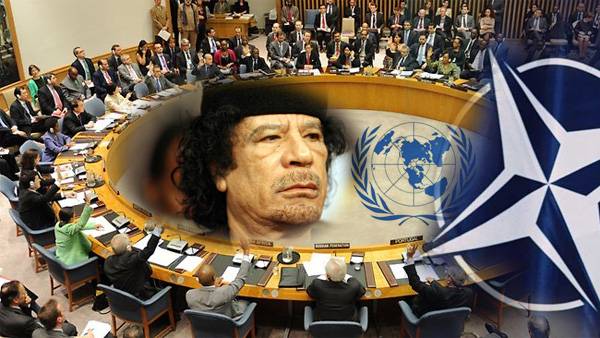UN Security Council Authorize Invasion of Oil-Rich Lybia
Source: news.xinhuanet.com

Representatives vote during an open meeting of the UN Security Council at the UN headquarters in New York, the United States, March 17, 2011. The UN Security Council on Thursday adopted a resolution to authorize a no-fly zone over Libya and called for "all necessary measures," excluding troops on the ground, to protect civilians under threat of attack in the North African country
Libya's anti-government movement is faced with a possible final defeat, as government forces recaptured the third largest city of Misrata on Thursday and was ready for actions against the rebels' headquarter Benghazi.
The Libyan state TV announced on Thursday afternoon that the government forces had recovered Misrata, 150 km northeast of the capital Tripoli, and were mobilizing for the final knockout in rebels' stronghold of Benghazi. The Libyan government forces announced earlier that it had regained control of most cities once in the hands of the rebels.
Since March 12 the situation in Libya has staged a U-turn, as the government forces, with a stunning speed, reseized within just four to five days a number of rebel-held cities and towns, including the western city of Zawiyah and eastern cities of Bin Jawad, Ras Lanuf, Brega and Ajdabiya.
The rebels currently controlled only their headquarters Benghazi, but the government forces are completing their siege of the city and will soon cut off the rebels' route of retreat to Egypt.
Libyan militaries have launched a psywar against residents and rebels in Benghazi for the past couple of days, asking through leaflets and broadcast that residents keep away from rebels-controlled areas as the government forces were ready for the final offensive.
Libyan leader Muammar Gaddafi said in his recent interview with the French daily Le Figaro that members of the "interim national governing council" in Benghazi, headed by former Justice Minister Mustafa Abdul-Jalil, are likely to flee to Egypt in the end, adding that former military officers and government officials involved in the anti-government movement will be spared and will not be held responsible if they choose to stay in Libya.
On Wednesday, Gaddafi's son Saif al-Islam said the government forces were approaching Benghazi and all military operations against the rebels would be over in 48 hours. He told reporters that Benghazi, the second largest city in the country, would fall whether the UN Security Council agreed to impose a no-fly zone or not.
Though the UN Security Council on Thursday passed the vote to permit "all necessary measures" to impose a no-fly zone in Libya, some countries warned of an open-ended conflict that could undermine stability across the oil-rich region.
"There is a need to avoid such destabilizing developments," Russian Ambassador Vitaly Churkin said, calling the resolution "most unfortunate." Germany's ambassador Peter Wittig predicted "great risks" and "the danger of being drawn into a protracted military conflict that would affect the wider part of the region."
The Libyan government, with confidence boosted by its military victories, has begun to consider its oil policies when situation stabilizes.
Deputy Foreign Minister Kaim said Wednesday that Libya may adopt preferential policies when renewing its oil contracts with other countries, and the new measures will be reflected in Libya's cooperation with other countries in oil-related fields.
He said Libya will continue to respect the existing contracts with oil companies of the West, adding that the country's national oil company still maintains contact with some partners of the West, including several U.S. companies.
Kaim expressed the hope that the safety of all people will be secured in Libya and those who left the country temporarily due to the current turbulence will return to the country to resume work soon. But Kaim admitted that the current crisis will inevitably affect its cooperation with some Western oil companies.
Earlier, the head of Libya's National Oil Corporation, Shukri Ghanem,said all oil fields in the country had remained intact, though some armed groups looted oil companies' production bases and warehouses in costal cities such as Ras Lanuf and Brega, taking cars, heavy machinery and other supplies, and interrupting the facilities' normal operation.
Source: xinhuanet.com






















